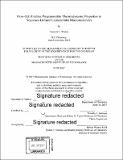Flow-IEG enables programmable thermodynamic properties in sequence-defined unimolecular macromolecules
Author(s)
Wicker, Amanda C. (Amanda Catherine)
DownloadFull printable version (9.332Mb)
Other Contributors
Massachusetts Institute of Technology. Department of Chemistry.
Advisor
Timothy F. Jamison.
Terms of use
Metadata
Show full item recordAbstract
Flow-IEG has emerged as a powerful platform for the production of sequence-defined macromolecules and has demonstrated the utility of adapting continuous-flow methodologies to the production of materials for structure/function analysis. Our Flow-IEG system has been expanded to include both the ruthenium-catalyzed azide-alkyne cycloaddition (RuAAC), as well as a more operationally simple version of the copper-catalyzed analogue (CuAAC). These advances have enabled the rapid synthesis of a library of oligomers with systematic variations in triazole connectivity, allowing us to probe the consequences of sequential connectivity on material properties. In our investigation, we found that the crystallinity of the synthesized materials increased with higher proportions of 1,4- to 1,5-triazoles, from which a set of predictive design rules was developed and applied to a second library of diblock copolymers. Furthermore, we discovered that the crystallization properties of these macromolecules were highly dependent on both their monomer sequence and triazole substitution pattern. The results of these studies are reported herein.
Description
Thesis: S.M., Massachusetts Institute of Technology, Department of Chemistry, 2017. Cataloged from PDF version of thesis. Includes bibliographical references (pages 40-42).
Date issued
2017Department
Massachusetts Institute of Technology. Department of ChemistryPublisher
Massachusetts Institute of Technology
Keywords
Chemistry.